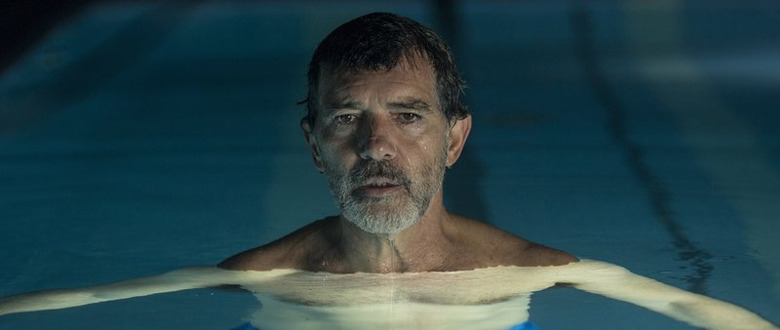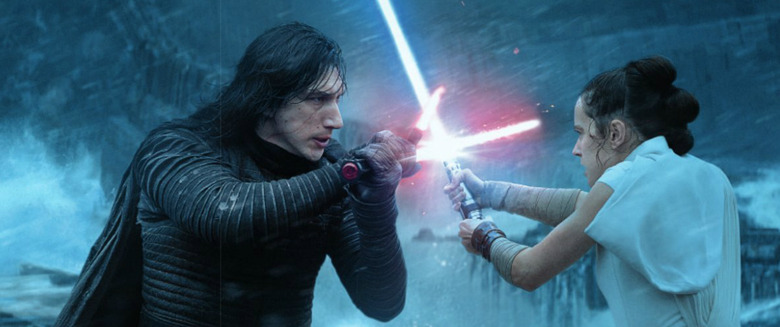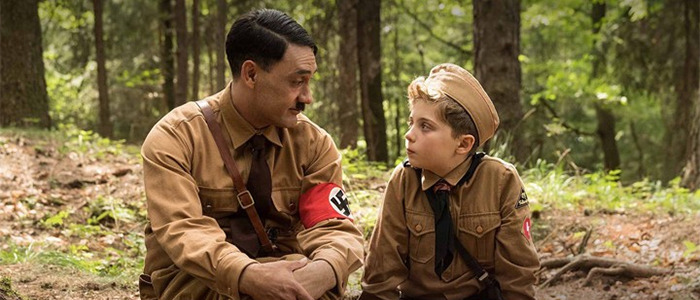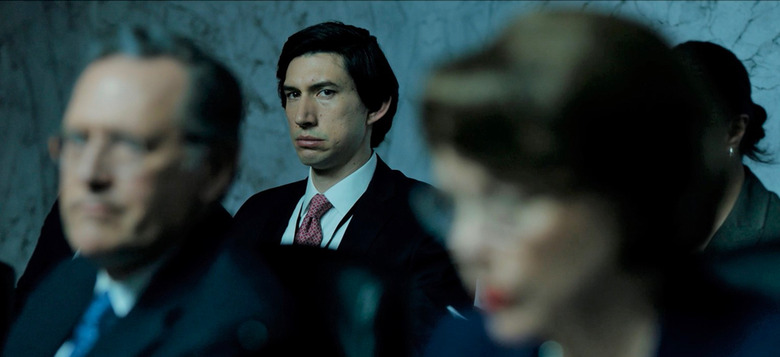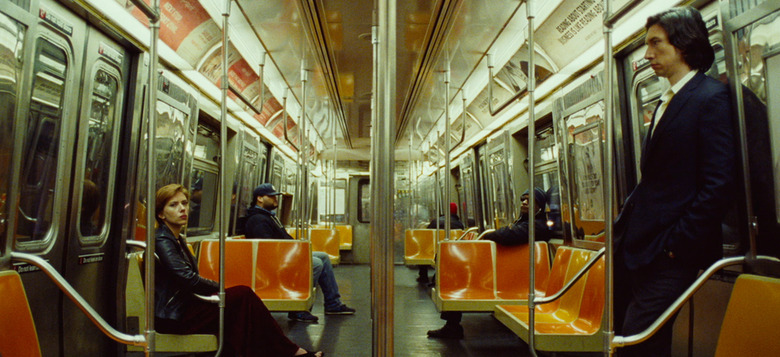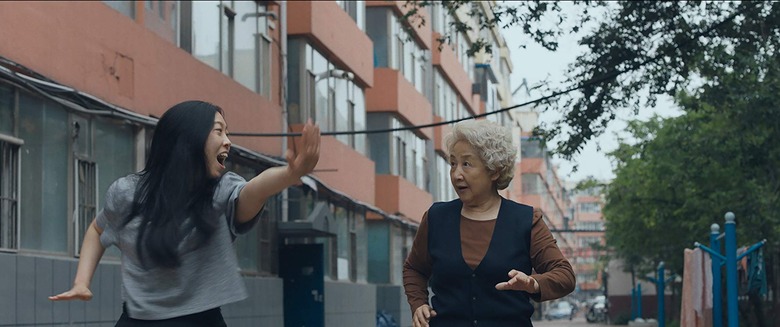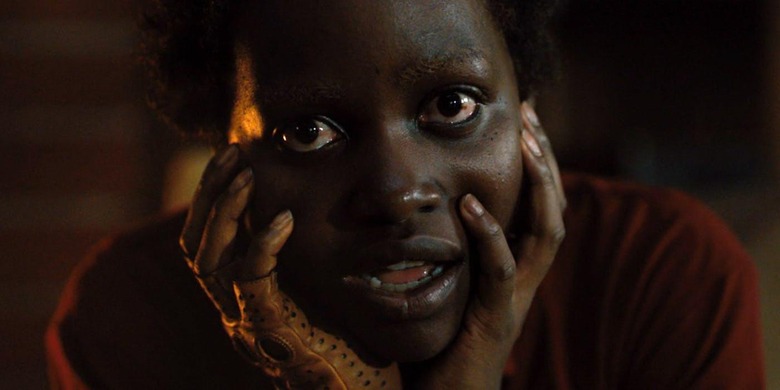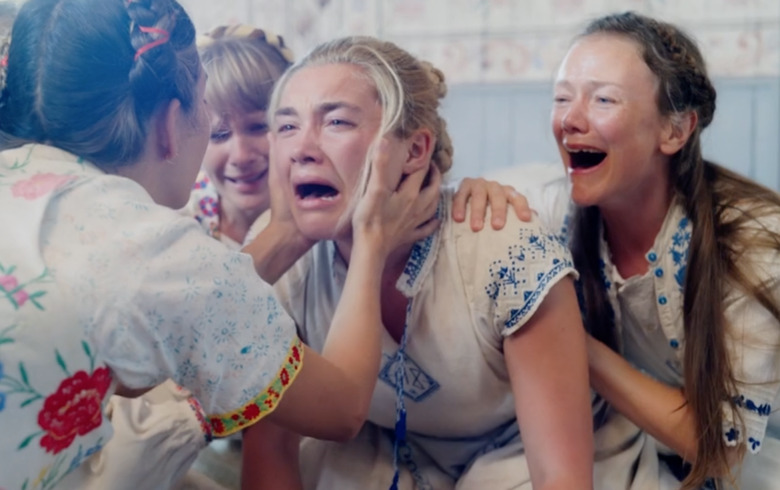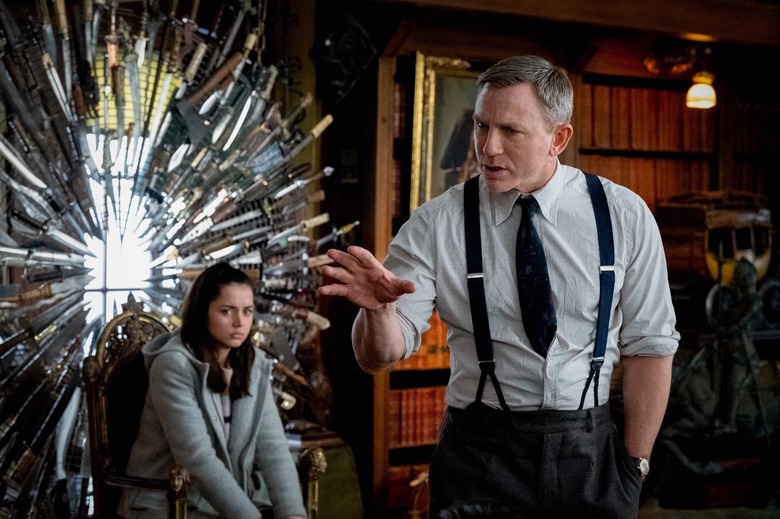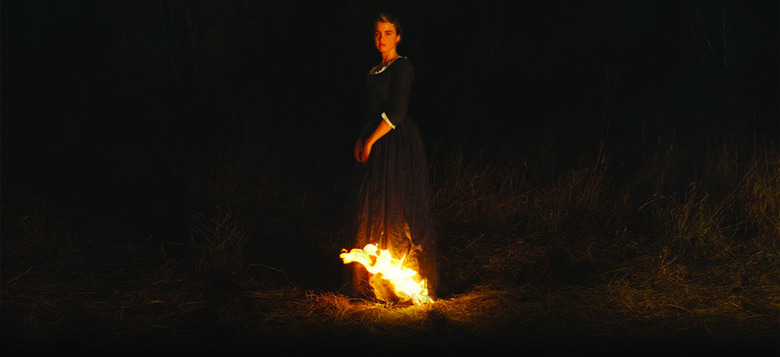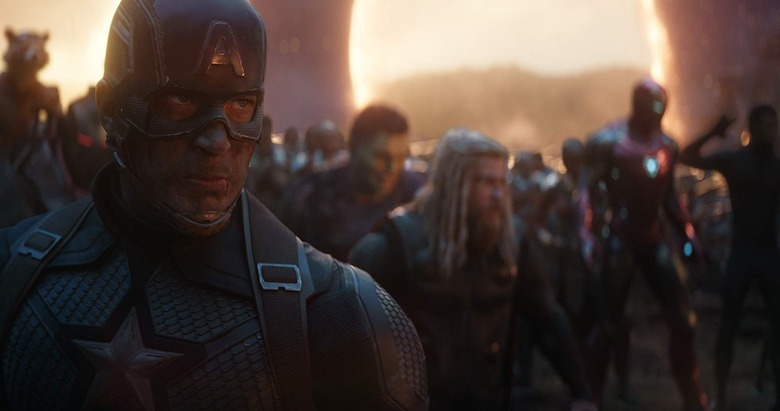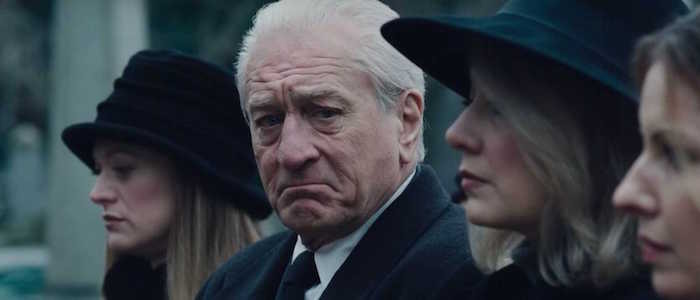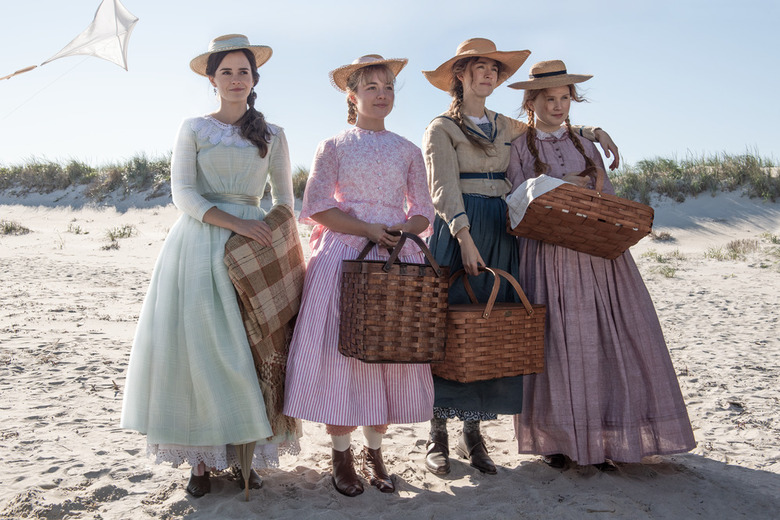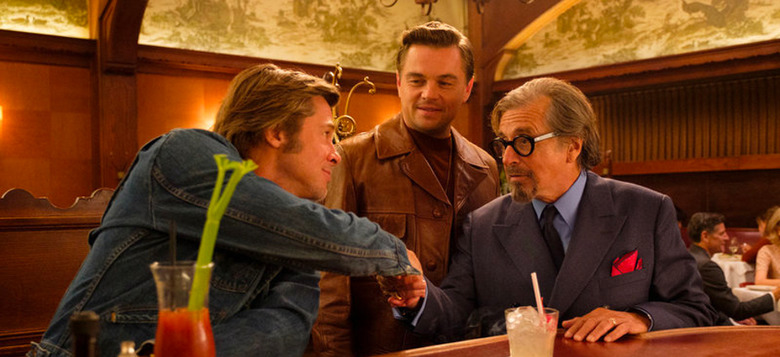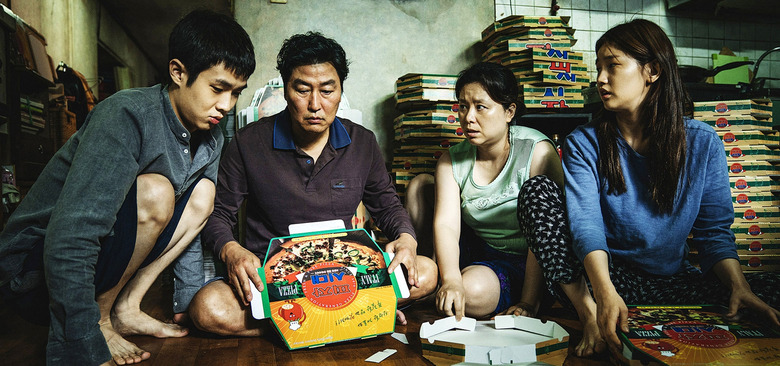/Film's Top 15 Movies Of 2019
Over the past week, we have published individual Top 10 Movies of 2019 lists for each member of the /Film staff. And behind the scenes, we've been crunching the numbers to determine a list that represents the site as whole, with all of our most treasured films from the past year featured.
And while not every beloved film made our final Top 15 of 2019 list (The Lighthouse missed it by this much!), we feel that the movies below not only represent the site's overall tastes, but also what a tremendous year for cinema 2019 really was.
15. Pain and Glory
Hoai-Tran Bui: Subtlety is not the medium in which Pedro Almodovar operates. Every Almodovar movie is a glorious shout to the world — a cry of elation, frustration, desperation, or regret. Pain and Glory, Almodovar's semi-autobiographical masterwork, that cry starts out softly at first, barely heard amid the Spanish auteur's contemplative interrogation of memory and creation. But that cry grows until it fills the frame with emotion, threatening to overflow. Antonio Banderas gives a tour-de-force performance as aging film director Salvador Mallo, whose regrets and mistakes are literally written all over his body — in surgical scars, in the pain in his joints, in his constant migraines. Restless to get back to work and resentful of the body that has betrayed him, Salvador finds himself returning to the sunny days of his childhood, when the summers smelled of piss and cinema was a grand escape for him. Pain and Glory is a circular film about the indelible moments in life that spark creativity, and vice versa.
14. Star Wars: The Rise of Skywalker
Peter Sciretta: Star Wars: The Rise of Skywalker is an emotionally exhausting, but immensely satisfying conclusion to not only the Star Wars sequel trilogy, but the entire Skywalker saga. Director JJ Abrams had an audacious task and nailed it despite seemingly insurmountable obstacles by changing the rules of the game in a way that would make James T. Kirk proud (yes, we're mixing our sci-fi franchises here). Daisy Ridley and Adam Driver provide gripping performances that perfectly tie together the film's themes and provide that beautiful emotional core. The magical interactions between the film's core trio is a delight and I'm sad this saga has come to an end...even though Rey's journey has only just begun.
13. Jojo Rabbit
Ethan Anderton: It's a shame that we have to remind people how shitty Nazis were and how bad it is that they have a newfound confidence in today's circus of a political climate. But Taika Waititi deals with this burden as only he can with Jojo Rabbit. The movie follows a young boy (newcomer Roman Griffin Davis) who has been brought up to be a Nazi, hoping to become a man at a boys camp where they learn all the best ways to be cruel, hateful, and honor the Führer. But it should come as no surprise that all the Nazis in this movie are bumbling buffoons (Sam Rockwell and Rebel Wilson hilariously among them), and our main character has a lot of lessons to (un)learn from them when he discovers a teenage Jewish girl being hidden in his attic by his mother. Whipping back and forth between gutbusting comedy and heartbreaking drama, this is a story of acceptance and natural love in the face of indoctrinated hate. And it has Taika Waititi also making an absolute mockery of Hitler, so what else can you ask for?
12. The Report
Ethan Anderton: Despite seeing this movie at the 2019 Sundance Film Festival nearly an entire year ago, somehow this movie packs even more of a significant punch in the face of another pointless, senseless and unnecessary war on the horizon. The Reportlooks back at the morally reprehensible interrogation tactics utilized by the United States government in the wake of the terrorist attacks of 9/11. The torture on display is infuriating enough, but it's the inaction by our government to rectify the situation and admit their wrongdoings, mistakes made on both sides of the aisle by Republican and Democratic presidents, that is truly horrifying and upsetting. This movie is dense and rich with exposition that director and writer Scott Z. Burns makes sizzle in conversations between Adam Driver as Senate staffer Daniel Jones and and Annette Bening as Senator Dianne Feinstein, and for anyone who is unable to bring themselves to read the 500-page summary of the torture report, this movie acts as riveting and maddening Cliff's Notes for blood stains on our flag.Chris Evangelista: The Report is tragically even more relevant now than it was when it opened a few months ago. Those who ignore the past are doomed to repeat it, and sure enough, as America gears up to enter yet another endless, ill-thought-out war, The Report reminds us we've been here before and we're too damn stupid to learn anything. Of all the great Adam Driver performances of 2019, The Report is the best, requiring the actor to rattle off page after page of information and somehow make it all incredibly exciting and cinematic. Driver plays Senate staffer Daniel Jones who is tasked with looking into the CIA's "enhanced interrogation techniques" following 9/11. What Jones quickly discovers is that the CIA was flat-out torturing suspects, and gaining useless intel in the process. The CIA knew pretty quickly that what they were doing wasn't really working, and yet they kept on doing it anyway. The Report doesn't let anyone off the hook. While the enhanced techniques were instituted under George W. Bush, Jones sees first-hand that the Obama administration isn't exactly rushing to set things right. Writer-director Scott Z. Burns channels great political thrillers like All the President's Men to create a shocking, disturbingly timely story that deserves much more attention than it received.
11. Marriage Story
Jacob Hall: Noah Baumbach's surprisingly hopeful, wryly funny, and emotionally devastating dissection of a relationship in its final stages is one of the most human films of 2019. Rather than reduce one half of this failed marriage to a villain, Baumbach forces us to accept the harsher truth – these two people loved each other, still know each other better than anyone else on the planet, and both of them deserve our empathy as they endure the shittiest moment of their lives. Adam Driver and Scarlett Johansson give the best performances of their careers, culminating in an argument that cuts deeper than most horror movies. No one knows how to wound you quite like the person who loved you.
10. The Farewell
Jacob Hall: Lulu Wang's autobiographical drama is a low-key miracle, a tale of a culture clash that has equal respect and love for both sides while being unafraid to be brutally honest about each of them. What sounds depressing on paper – a grandmother is diagnosed with cancer and her Chinese family decides to keep the truth from her while her American granddaughter struggles to say goodbye without saying goodbye – is surprisingly joyous and funny in execution, with Awkwafina turning in a career-redefining performance. This is a movie about little moments, the tiny interactions with the people we love that linger long after the chaos of major events has settled. Wang is patient enough with these moments to make them feel like her own. And our own.Ethan Anderton: It's easy for movies that play the Sundance Film Festival to be impressive. The buzz in the mountains is heightened by the elevation and the excitement of seeing these movies for the very first time with a crowd of movie lovers. But every now and then, one of those movies has the legs to go the distance all the way to the Oscars the following year, and The Farewell is one of them. Written and directed by Lulu Wang, the film tells the story of a Chinese family trying to keep a terminal cancer diagnosis from their grandmother. They all use the guise of a cousin's wedding as an opportunity to say their goodbyes, and the result is a funny, touching, story that is representative of an under-served culture on the big screen, and one that is very personal to Lulu Wang. But the movie also resonates universally in its approach to family love, memories, identity and success, largely thanks to a breakthrough, award-worthy performance from Awkwafina.Hoai-Tran Bui: I know a lot of people were dissatisfied with Crazy Rich Asians, which was touted as the watershed movie for Asian-American representation in Hollywood, because of its overly broad appeal. But where Crazy Rich Asians goes as broad and as big as possible, The Farewell goes specific and small. And in achieving that perfect note of cultural specificity, it manages to be both incredibly intimate and universal. Based on the true story of director Lulu Wang, The Farewell is a story of cultural and generational clash through the perspective of Billi (Awkwafina in her dramatic breakout role), a Chinese-American woman who learns that her grandmother Nai Nai (Zhao Shuzhen) is dying. Shocked to learn that, in keeping with Chinese custom, her family is keeping the truth of the illness from Nai Nai, Billi joins them in China under the pretense of attending a wedding so that they can spend one last time with Nai Nai. Quietly devastating and devastatingly funny, The Farewell is a candid and complicated portrayal of grief and the difference between how the east and west process that grief. The Farewell doesn't ask you to understand the choices by its characters. But it does allow you to live with them as they live with those choices, and feel every flicker of turmoil and sorrow.Chris Evangelista: I'll admit to being a bit indifferent to the talents of Awkwafina before I saw The Farewell. It wasn't that I didn't like the comedian/rapper/actress, it was just that I had yet to figure out what all the hubbub was about. That all changed when I caught Lulu Wang's marvelous film at Sundance. Here, Awkwafina showed an amazing range that I'm not sure many people suspected she possessed, turning in a deeply human performance that had its touches of comedy but was mostly dramatic. Based on a true story, The Farewell has Awkwafina playing Billi, a Chinese-American woman who learns that her beloved Nai Nai (Zhao Shuzhen) is dying. But, in keeping with Chinese custom, the extended family has decided to keep Nai Nai's illness a secret from the elderly woman. Instead, they plan to gather together for the purposes of a wedding while also using the occasion to spend one final time with Nai Nai. None of this sits very well with Billi, who thinks her dying grandmother should be made aware of what's going on. This is Awkwafina's show, but Wang also takes time to give the rest of Billi's family ample time, creating a complicated but loving portrait of the clashing of both generations and cultures.
9. Us
Jacob Hall: Get Out suggested that Jordan Peele was one of the most exciting filmmakers of the 21st century. Us proves it. This high-concept horror film showcases the power of genre filmmaking at its finest – outrageous and terrifying and impossible concepts that cannot exist in a traditional story are allowed to run wild here, illuminating harsh truths and asking big questions that could not fit within a traditional narrative. Us manages to have to have its cake and eat it too, delivering a visceral, crowd-pleasing horror movie while also offering a buffet of biting social commentary that inspires conversation and debate for weeks after the credits roll. And if the Oscars actually mattered, Lupita Nyong'o would be in consideration for her astonishing work here, playing two roles that could not be more different (including the movie villain of 2019).Ethan Anderton: Jordan Peele exploded onto the big screen as a filmmaker with Get Out. But rather than get comfortable with his sophomore effort, Peele gets more ambitious, creating a movie that is riddled with ambiguous metaphors, full of multiple hidden meanings. Is it about a culture losing its identity as it assimilates into a society in order to find acceptance? Is it about empty promises to a race of people that still left behind? Is is about the duality of mankind and the good and evil inside all of us? What if it's about all of that and more? Furthermore, the film also features some of the most haunting performances of the year, especially from Lupita Nyong'o, whose croaky voice and chilling gaze never fail to create tension. This is horror at its absolute finest.Chris Evangelista: Jordan Peele's Get Out follow-up is weirder, denser, and more labyrinthine. Like Stanley Kubrick's The Shining, nearly every frame of Us feels as if it's loaded with clues, and secrets, and omens. You don't watch this movie, you absorb it. Lupita Nyong'o gives not one but two phenomenal performances here, playing a young mother haunted by her own doppelganger. Peele eventually provides a vague explanation for the doppelgangers that populate the film, but it's not needed. Why try to explain the unexplainable? At times, Us runs the risk of buckling under its own themes of class warfare, but Peele always manages to keep the narrative steady, working wonders to conjure up something wholly unique and entirely unforgettable.
8. Midsommar
Hoai-Tran Bui: Ari Aster's follow-up to Hereditary is the world's worst break-up movie. Disarmingly funny and surprisingly cathartic, Midsommar is perverse pastoral nightmare that follows the slow breakdown of a toxic relationship between the insecure Dani (Florence Pugh, in an all-timer of scream queen performances) and her gaslighting boyfriend Christian (Jack Reynor). Reeling from a family tragedy, Dani invites herself on a trip with Christian and his frat bro friends to see the rare midsummer festival in a secluded Swedish village. But this eternally sunny village's rituals soon take a turn for the violent. It's horror by the harsh light of day — with the abundance of nervous chuckles and bursts of bloody carnage lending to the film's freakish nature. But, Midsommar argues, the real horror and the most insidious violence is in a bad relationship, and the people who refuse to share your grief.Chris Evangelista: Director Ari Aster described Midsommar as an "apocalyptic breakup movie" before it opened, and he wasn't kidding. This is like a rom-com with a body count. Aster's Hereditary follow-up is more ambitious and more audacious. It's also surprisingly funny as hell. Neurotic, insecure Dani (Florence Pugh) tags along on a trip to Sweeden with her genuinely terrible gaslighting boyfriend Christian (Jack Reynor) and his pals. There, they take part in a midsummer festival that looks sunny and festive and inviting – and then slowly goes off the rails. Aster runs his cast through the wringer, with Pugh having to do the brunt of the heavy-lifting, and succeeding marvelously. There's a reason everyone can't stop talking about her these days.Ben Pearson: Ari Aster's follow-up to Hereditary is a wholly different cinematic experience, but still very clearly from the same twisted mind. Midsommar is the closest thing I've seen to the original version of The Wicker Man since 2011's Kill List (although all three films have their own distinct identities). Aster's sun-soaked horror movie is all about the terror of the unfamiliar, and about finding an unconventional family in an unexpected place. Florence Pugh delivers one of the year's best performances as Dani, an emotionally drained woman who just needs some support during a rough time in her life, but doesn't get it from her self-centered boyfriend (a solid Jack Reynor). The film is loaded with subtle hints that point toward its ending, which feels simultaneously shocking and inevitable and perfectly walks the line between disturbing and cathartic.
7. Knives Out
Jacob Hall: The first time I watched Knives Out, I understood it was one of the most entertaining films of the year. The second time I watched it, I realized this Agatha Christie-stlye throwback carefully masks one of the most spectacularly constructed and humane movies of the year in the most crowd-pleasing and accessible shell possible. Daniel Craig's southern-fried detective is the initial draw here (and he's wonderful), but writer/director Rian Johnson realizes that Ana de Armas is the real heart of the film, playing a young immigrant nurse who finds herself embroiled in a vicious murder mystery that exposes the darkest corners of the American nightmare. It's funny and it's sweet and every twist lands and every scene is an absolute pleasure to witness.Ethan Anderton: The classic murder mystery is a genre that has fallen by the wayside in favor of thrilling true crime stories. But director Rian Johnson has infused new life into the whodunit with Knives Out. However, this particular murder mystery comes with a heavy dose of relevant social commentary about racism, class and entitlement. Ana De Armas gives a breakthrough performance as the home nurse who gets caught up in more intrigue than she ever could have imagined, and Daniel Craig becomes a delightful deep fried southern detective who gives Hercule Poirot a run for his money, and he even has a better name in Benoit Blanc. Combine that with an incredible ensemble cast where each actor gets their chance to shine, and you've got one hell of a flick.Hoai-Tran Bui: With a cast as star-studded, a script as sharp, a theme as timely, and a film as stylish as Knives Out, how could it not be one of the best movies of 2019? Rian Johnson's Agatha Christie-inspired whodunit that toes the line between subversive satire and murder-mystery love letter, Knives Out is a delightfully energetic and unpredictable magic trick of a movie. After the supposed suicide of a wealthy patriarch (Christopher Plummer), a renowned private detective (Daniel Craig) is called in to investigate the dead man's extended family. Every scene is chewed to bits by the phenomenal cast — for whom no role is too small — most of all by Craig, who is having a blast as the eccentric detective with the most deep fried of Southern accents and a fondness for doughnut metaphors. But the breakout and emotional anchor is Ana de Armas, who plays the deceased patriarch's kind nurse who gets dragged into the family's entangled web of schemes. Johnson elevates the frothy character actor elements with a highly topical story that at times can be a little on the nose, but makes for a whodunit that is a little more nutritious than a doughnut hole.Chris Evangelista: Rian Johnson takes the whodunit genre and flips it upsidedown, crafting a film that's both lovingly referential and delightfully subversive. You enter Knives Out thinking it's going to be a standard locked room mystery, but like the best of magicians, Johnson has a ton of tricks up his sleeve. Nothing goes the way you expect it to, and what a delight it all is. When a wealthy patriarch (Christopher Plummer) turns up dead, a private detective (Daniel Craig, having the time of his life) is called in to investigate the dead man's extended family, all of whom make for pretty great suspects. But the film really belongs to Ana de Armas, playing the deceased party's nurse. Armas breaks out in a big way, bringing a sweetness coupled with killer comic timing that more directors would be wise to exploit going forward. Johnson peppers in current events into the backdrop of the film – some of which are a bit clunky. But that's okay. The end result is a total gem, and yet another 2019 movie about how terrible and oblivious wealthy, privileged people can be.Ben Pearson: Rian Johnson is near the top of the list of my favorite working filmmakers, and I was thrilled when word came out that he'd be tackling an Agatha Christie-inspired murder mystery. In Knives Out, Johnson wonderfully captures the tone of those novels, bringing that classic detective formula into the modern day and providing some twists we haven't seen before in the process. And while it has a great ensemble cast, including an especially fun turn from Daniel Craig as Benoit Blanc, it also has a real message about immigration and politics as expressed through the character of Marta, the film's stealth lead who's played by rising star Ana de Armas. I can't wait to rewatch this.
6. Portrait of a Lady on Fire
Hoai-Tran Bui: How do you condense 2,000 years worth of love poetry into a two-hour film? Celine Sciamma somehow figured it out with her ravishing lesbian romance Portrait of a Lady on Fire, one of the few movies that unironically deserves the descriptor "poetic cinema." If to be truly seen is the ultimate form of love, Portrait of a Lady of Fire is love incarnate. Every frame is a work of art, every glance loaded with unspoken emotion and desire. Taking place in 1770, the film follows a female artist (Noémie Merlant) who is commissioned to paint the wedding portrait of a mysterious daughter (Adèle Haenel) of a French countess, under the pretense of being her walking companion. A close friendship blooms into attraction, and the two share a searing romance for the ages. Portrait of a Lady on Fire is that low burn of desire in your stomach and the choked-back tears in your throat — mythic and epic and intimate all at once.Chris Evangelista: Céline Sciamma's achingly gorgeous love story follows an artist (Noémie Merlant) hired to discretely paint a portrait of a young woman (Adèle Haenel). A friendship grows between the two women – and it quickly blossoms into something deeper. Like Todd Haynes' Carol, Portrait of a Lady on Fire is a film about perceptions – a film about looking. Scene after scene, Sciamma has her characters intently studying the places, and people, before them. As a result, we can feel the desire radiating off this film, as hot and scorching as any flame.Ben Pearson: Listeners of our /Film Daily podcast and readers of the site's Best of the Decade coverage may be sick of hearing me talk about this movie, but in the words of pop star Selena Gomez, the heart wants what it wants. Portrait of a Lady on Fire is, quite simply, one of the best movies about love that I've ever seen. The film is a classical, aching romance that's so beautiful it hurts, and writer/director Céline Sciamma's heart-rending script and expert direction results in cinematic images that are even more beautiful than the gorgeous paintings we see throughout the movie. Noémie Merlant and Adèle Haenel are utterly mesmerizing in this devastating, punch-drunk love story that left me dazed as I walked out of the theater. I've thought about it every single day since.
5. Avengers: Endgame
Ethan Anderton: Blockbusters tend not to get much love during awards season, and even when critics round-up their end of the year lists, prestigious dramas often outshine these big budget special effects extravaganzas. But in the same way that the Academy gave a record number of Oscars to Lord of the Rings: Return of the King in honor of Peter Jackson's achievement for the entire J.R.R. Tolkien trilogy, Avengers: Endgame deserves recognition as the culmination of an unprecedented blockbuster franchise featuring interconnected stories, crossover characters, and an overarching narrative that builds to something truly spectacular. But even without taking into account this conclusion to the first era of the Marvel Cinematic Universe, this is a blockbuster that packs an emotion punch, brings some of the most astounding comic book action to life, and has some damn fine performances from the core team of superheroes played by Robert Downey Jr., Chris Evans, Scarlett Johansson, Mark Ruffalo and Jeremy Renner.Ben Pearson: While I don't suspect the Marvel Cinematic Universe will truly end any time soon, Avengers: Endgame is as satisfying a conclusion as I could have hoped for when it comes to Marvel's so-called Infinity Saga. A three-hour superhero time travel heist film that manages to balance bleakness with effective comedic asides, it's a movie containing several genuinely cheer-worthy moments (as opposed to, say, cheering during a Stan Lee cameo). Cap wielding Mjolnir. Peter Parker's return to life. Scott Lang reuniting with his now-grown daughter. Tony Stark's snap. Cap and Peggy's last dance. Endgame has tangible emotional stakes, ones that have been built up for years and – here's the impressive part – actually pay off in gratifying ways. In a world in which would-be mega-blockbusters are all chasing this particular high, Endgame is a narratively worthy high to chase.
4. The Irishman
Jacob Hall: The Irishman uses your knowledge of Martin Scorsese's own movies against you. Just when you think it's another riff on Goodfellas, just when you think it's Casino 2.0, just when you get cozy with something that feels familiar, the greatest filmmaker of the past 50 years starts asking the harsh questions and offering harsher answers. Much has already been said about the impressive visual effects that de-age and age Robert De Niro, Joe Pesci, and Al Pacino (all giving tremendous performances), but that's no gimmick. Instead, this film forces us to watch as these men, powerful and seductive and assured, age before our very eyes, with years sometimes passing in a single cut. The rapid-fire pace of those first two hours is all a misdirection – the final agonizing 90 minutes intentionally slow down as we linger with these men in their old age, their youth gone in a flash as they face a future with no legacy. The Irishman isn't just about gangsters. It's Scorsese intentionally echoing his oldest tricks before asking himself, and us, "Who is going to remember me? Will my work matter?" This film answers that definitively: of course.Ethan Anderton: Death comes for all of us, and that seems to be something that's on the mind of director Martin Scorsese with his epic crime drama The Irishman. Throughout the movie, text appears in front of various crime bosses and thugs detailing the manner of the year in which they died and the gruesome manner in which they met their end. No matter the power they had, the money they grabbed, the status they earned, they all ended up in the same place: six feet in the ground. And that's exactly where we're all headed. So what is our legacy? What are we leaving behind? What will truly matter when we all reach the end? This is exactly what Frank Sheeran (Robert De Niro) is left wondering as the last man standing from these decades of crime and betrayal. The final shot brings together everything that came before it as Frank asks a visiting priest at his nursing home to leave the door to his room open a little bit. Is it in memory of the man he betrayed? Is it a hope that his family will one day walk through it and understand the sacrifices he made for them, even if they were misguided? Or is it his way of keeping the door open to the past where he felt like his life had purpose? Maybe it's all of that.Chris Evangelista: The gangster version of Barry Lyndon. Martin Scorsese's The Irishman is a tour de force – the mob movie to end all mob movies. Spanning decades (with a hefty runtime), The Irishman is a bookend to Scorsese's other two mob collaborations with Robert De Niro, GoodFellas and Casino. If GoodFellas is a story of youth, and Casino is a tale of adulthood, The Irishman is the twilight years – where the ticking clock is growing louder, and the world that you thought you knew is nothing more than a hazy memory. Frank "The Irishman" Sheeran (De Niro) takes us on a journey through his long, blood-drenched life as he rises from a meat truck driver to mafia hitman. Frank is guided by two different men. One is mob boss Russell Buffalino (Joe Pesci), the other is Teamsters boss Jimmy Hoffa (Al Pacino, having a blast here). Hoffa is all bluster while Russell is quieter; more subdued. This gives Pesci, who had been in retirement until now, a chance to do something much different than he's done before. His character here isn't one of the volatile, motormouthed wiseguys he's played in the past. He's calm and even grandfatherly – but that doesn't mean he's any less deadly. The first two hours of Scorsese's epic are a showcase for a life of crime, but they're just setting-up the bleak, heartbreaking final hour as Frank grows old and feeble and learns that everything he did – all the hits, all the history-making crimes – were all for nothing. Sooner or later, everyone's number is up. And when your time comes, what will you be remembered for? Will you even be remembered at all? Don't close the door all the way.
3. Little Women
Jacob Hall: As an emotional experience, it's hard to beat Little Women, a film that had tears of joy and sorrow streaming down my face for its entire back half. Louisa May Alcott's classic novel still draws an audience for a reason: it works, damn it. But beyond those classic pillars, writer/director Greta Gerwig quietly infuses her adaptation with a modern sensibility, drawing from Alcott's own life and experiences to further enrich the text and offer a bridge to modern audiences. By restructuring the story to jump between the past and the present, Gerwig allows the tragedies and the joys to coexist and intermingle, a cocktail of memories and experiences that feel as gloriously, powerfully messy as a human life. It's just plain wonderful.Ethan Anderton: Despite loving Frances Ha and Lady Bird, my excitement for Greta Gerwig tackling a new adaptation of Little Women was almost non-existent. Even the presence of a stellar cast that includes Saoirse Ronan, Florence Pugh, Emma Watson, Eliza Scanlen, Laura Dern, Timothée Chalamet, Tracy Letts and Bob Odenkirk didn't prepare me for how much I would end up loving this movie. Gerwig has injected modern life into this classic tale, finding a refreshing way to tell the story of aspiring writer Jo March by jumping back and forth in time, allowing many emotional beats to resonate in new ways. This movie lifts you up, occasionally knocks you down, but leaves your heart filled to the brim.Hoai-Tran Bui: Greta Gerwig has crafted a film that I want to wrap myself up in and never leave. Little Women has always held a special place in my heart, but Gerwig has injected Louisa May Alcott's timeless classic with a fresh modernity that makes all of the characters feel beautifully, painfully human. Following four wildly different sisters growing up during and after the Civil War, Little Women tackles all the joys and sadness of that awkward transition to adulthood with an inventive non-linear structure that shakes up Alcott's well-known story. But to say that Gerwig gave Alcott's creaky 200-year-old story a shiny new coat of modern feminist paint would be a falsehood: the directly simply hones in on the incredibly progressive elements of the story and shines a spotlight on them: from Jo's (Saoirse Ronan) literary ambitions and dreams of independence, to Amy's (Florence Pugh) savvy navigation of a society that is stacked against women. Anchored by award-worthy performances from the entire cast and clever directorial flairs that reward you upon each rewatch, Little Women is a rapturous portrait of humanity in all its messy, wonderful details.Ben Pearson: Writer/director Greta Gerwig took the unusual tactic of restructuring Louisa May Alcott's classic story in her adaptation of Little Women. That shuffling resulted in a unique split approach to the movie, one which somehow seemed to give the events of the film an extra sense of destiny and which added extra emotional weight to its saddest moment. Every single actor is perfectly selected and ideally equipped to play their character, but special props go to Saoirse Ronan's Jo, Laura Dern's Marmie, Florence Pugh's Amy, and Timothée Chalamet's Laurie. You can feel the familial love radiating between these actresses, and the cinematography and production design make the movie feel like a soft, warm blanket that I wanted to envelope me forever. This was the movie Gerwig was born to make.
2. Once Upon a Time in Hollywood
Jacob Hall: Quentin Tarantino's ode to a Hollywood that once was, never was, and never will be again is his most joyful, melancholy, and sweet movie. Even though it does indulge in his trademark extreme violence (one of the funniest and most shocking scenes of 2019), it's mostly a hangout movie, allowing us to experience a few days in Hollywood in 1969, right as the industry, and the world, was about to change forever. As an aging actor and his devoted stuntman, Leonardo DiCaprio and Brad Pitt showcase a chemistry that is second-to-none and their ambling adventures are as entertaining, and as surprisingly poignant, as anything on screen in recent years.Ethan Anderton: It's no secret that writer and director Quentin Tarantino is one of the most informed and educated cinephiles working today. So who better to write a love letter to Holllywood as the classic Tinseltown that everyone used to admire was on the verge of losing its innocence. At the same time, we have aging actor Rick Dalton (Leonardo DiCaprio) and his driver and stuntman Cliff Booth (Brad Pitt) on their way out of the spotlight, and a rising star in the form of Sharon Tate (Margot Robbie), high on the promise of her dreams coming true. These three are facing an America that is about to drastically change, and in the real world, their stories have a tragic ending. But Tarantino gives them a fairytale ending, albeit with some blood and gore, that lets this dreamy alternate version of Hollywood continue on in with newfound hope.Chris Evangelista: Once Upon a Time in Hollywood is a hang-out film, a love letter to the past, a melancholy fairy tale. It's all these things, and more. Set in and around L.A. in 1969, Quentin Tarantino's magnum opus zeroes in on an insecure actor (Leonardo DiCaprio) and his cool-as-ice stunt double/best friend (Brad Pitt). In the background of it all is Sharon Tate (Margot Robbie), the doomed starlet who met a tragic end at the hand of the Manson Family. But Tarantino isn't making a Manson movie. He's making a movie about dreamers in the city of dreams – people who feel fully alive, drawing us into a world that's long gone. In fact, it never even existed. In the end, we're all nostalgic for a fantasy.Ben Pearson: The hot takes were a'flyin' when Quentin Tarantino's latest landed in theaters last summer, but I think time has been kind to this one. I recently rewatched Once Upon a Time in Hollywood, and still found it to be Tarantino's nicest, most reserved movie since 1997's Jackie Brown – a breezy, soulful look at a bygone era, and a reclaiming and reframing of a woman whose tragic death has overshadowed her life. I love hanging out with Rick Dalton and Cliff Booth, cruising around 1969 L.A. and watching these guys navigate their relationship as it hits a crucial turning point. I love spending time with Sharon Tate, seeing her vivacious personality on full display. I love the music, the cars, the vibe. Once Upon a Time is Tarantino's most well-realized fairytale, a loving ode to a laser-focused time period so lovingly recreated that it feels immersive in a way nothing else he's directed quite has.
1. Parasite
Jacob Hall: If Alfred Hitchcock had a conscience to match his breathtaking skills as a purveyor of cinematic chills and thrills, he would've made Parasite. Bong Joon-ho's masterpiece is impossible to pin down when you're watching it and impossible to define after it's over. It's a satirical comedy. It's a low-key heist movie. It's a twisted thriller. It's a horror movie. It's a family tragedy. It is all of these things at once, never allowing itself to be boxed in, never content to be familiar or to do anything expected. But even as it thrills and shocks and barrels down left turns that no one saw coming, Parasite never loses sight of its characters and their plight, landing one devastating blow after another. And through our blurred vision, we realize that Parasite isn't just about these characters. It's about all of us.Ethan Anderton: With all the buzz surrounding this movie once it hit theaters back in the fall, I was glad to experience it having read very little about the plot. That made this a roller coaster of a theatrical experience, especially since the movie isn't so easily defined in one particular genre, fluctuating from an amusing family heist to a grim thriller and a poignant commentary on class. Full of suspense, horror, comedy, chills, and plenty of shocking twists, there's no movie out there like Parasite. Director Bong Joon-ho lifts up the poor, knocks down the rich, but ultimately takes blender to everyone to show that we're all animals willing to do whatever we have to in order to keep what we have or get something more, even if it means defying others of the same satisfaction. It's brutal in its scathing commentary on the dark side of our ambitions, and even though the escalation of the film's thrills feel like they could only exist on the big screen, the sentiment of what happens on the screen is very much present in our everyday lives.Hoai-Tran Bui: Bong Joon-ho's genre-defying masterpiece is a pitch-black exclamation point on which to end this year of "eat the rich" films. But rather than celebrating the humiliation of the wealthy in a grand feast of schadenfreude, Parasite pulls the wool from over our eyes to show that when you eat the rich, you're still a cannibal. At once a comedy, a razor-sharp social satire, a twisted fairy tale, and a Hitchcockian suspense film, Parasite defies categorization and defies comparison. Bong expertly interweaves a tale of two families, one insanely wealthy and one impoverished, as the poor Kim family cons their way into the employ of the rich Park family. Then, the film pulls a narrative sleight of hand that upends all expectations. Filled with nonstop twists and turns, Parasite is the rare arthouse film that can be enjoyed as an entertaining surface-level thriller — but once you look underneath the surface, the horrors of capitalism and class division become hideously clear.Chris Evangelista: Another entry in the "down with the wealthy" subgenre of 2019, and the best of the bunch. Bong Joon-ho's Parasite is an almost unclassifiable film. It has all the ingredients for a mystery, a thriller, a comedy, a horror movie, and more. But just when you think you've grasped what Bong is going for, Parasite pulls the rug out from under you and goes off in another wild, eye-popping direction. A down-on-their-luck family cons their way into working for a much wealthier household, and that's when you start to think: "Oh, this is going to be all about these have-nots taking over the lives of the haves." But no, that's not what's going on at all. Instead, Parasite goes deeper – literally, revealing a previously unrevealed basement to the house that has secrets of its own. Parasite courses with energy as Bong stages one dazzling set-piece after another, reminding us why he's one of the best filmmakers around right now.Ben Pearson: Writer/director Peter Bogdonovich once said, "I like films where you feel like somebody's home." Parasite fits that criteria in more ways than one. Not only are there multiple families jostling for control of the movie's glamorous house (including a reveal that "somebody's home" in a secret basement), but from a filmmaking standpoint, co-writer and director Bong Joon-ho is in obvious control of each aspect of the production. Every single movement of the camera feels clearly motivated and meticulously planned, the production design is exquisite, and the script, with its extensive exploration of class inequality, gave us the best of 2019's many "eat the rich" stories. Portrait may be timeless, but Parasite is the movie of the year.

